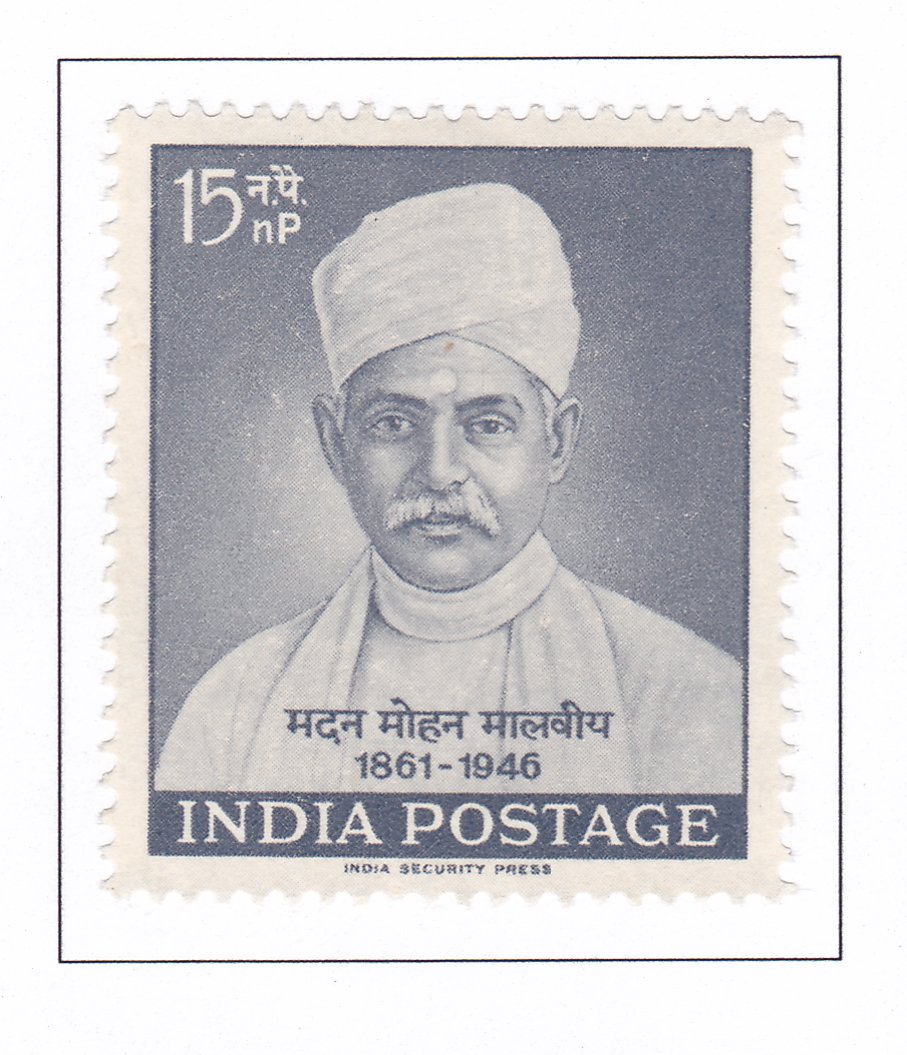Madan Mohan Malviya 1861-1946

Technical Data
| Stamp Set | Birth Centenary |
|---|---|
| Date of Issue | December 25, 1961 |
| Denomination | 15 nP |
| Quantity | 2,500,000 |
| Perforation | comb 14 x 13½ |
| Printer | Security Printing Press, Nashik |
| Watermark | Asokan Capital Multiple [Up] |
| Colors | Slate |
| Catalog Codes |
Michel IN 334 Stamp Number IN 350 Yvert et Tellier IN 135 Stanley Gibbons IN 448 |
| Themes | Anniversaries and Jubilees | Famous people | Headgear | Men | Teachers |
Pandit Madan Mohan Malviya, a towering figure in the annals of Indian nationalism, was hailed by Prime Minister Jawaharlal Nehru as a giant among men who played a pivotal role in shaping modern Indian nationalism and the struggle for freedom. Born on December 25th, 1861, in Allahabad, to the esteemed scholar Pandit Brij Nath, Malviya’s early education combined traditional Sanskrit learning with Western education.
Even during his college years at Muir Central College, Allahabad, Malviya displayed a keen interest in public affairs and social causes. He entered government service as an assistant master at the Government High School in Allahabad after graduating in 1884 but remained actively involved in political movements, joining the Indian National Congress and leaving a lasting impression with his debut appearance at its Calcutta session.
Pandit Malviya’s earnest dedication and tireless efforts quickly elevated him within the Congress ranks. He had the distinction of being elected president of the Indian National Congress three times, in 1909, 1918, and 1933. His commitment to action was matched by his emphasis on education and scholarship. Among his most significant endeavors was the founding of the Banaras Hindu University, described by Mahatma Gandhi as his chief contribution.
Malviya’s involvement extended beyond politics and education; he actively participated in the movement against the Jallianwala Bagh massacre, served on the Jallianwala Bagh Memorial Committee, and accompanied Mahatma Gandhi to the Second Round Table Conference in 1933. He also played a vital role in combating untouchability and promoting the Harijan movement, culminating in the establishment of the Harijan Sevak Sangh.
His deep-rooted religious convictions guided his philanthropic activities, aimed at fostering religious harmony and social justice. Malviya’s journalistic pursuits furthered his advocacy for social causes, with his newspapers, including Hindustan, Indian Union, and Leader of Allahabad, serving as platforms for expressing public grievances and opinions.
Mahatma Gandhi aptly acknowledged Malviya’s selfless dedication and tireless service to the nation, particularly through the establishment of the Banaras Hindu University, which he considered Malviya’s greatest achievement.
On December 25, 1961, as the nation commemorates the centenary of Pandit Madan Mohan Malviya’s birth, the Indian Post & Telegraph department pays homage to this illustrious son of India by issuing a special postage stamp featuring his portrait.
